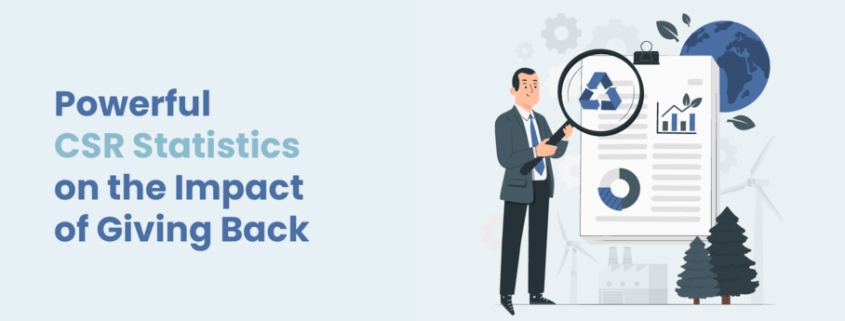15+ Powerful CSR Statistics About The Impact of Giving Back
Over the past few decades, corporate social responsibility (CSR) has catapulted into public consciousness with 70% of consumers wanting brands to take a stand on social and environmental issues.
For those who are new to this concept, CSR is a business model where companies integrate social and environmental concerns into their business operations. This often includes conducting activities like sustainable business practices and charitable giving programs.
In this article, we’ll dive into the latest CSR statistics and research to uncover the multifaceted impact of CSR, helping you understand which programs are most impactful and why. Here’s what we’ll cover:
- FAQ: Contextualizing These CSR Statistics
- General CSR Statistics to Know
- Workplace Giving Statistics
CSR initiatives impact employees, customers, investors, and communities alike for the better. Now, let’s dive into the current landscape of social responsibility.
FAQ: Contextualizing These CSR Statistics
Before sharing our CSR research, let’s provide some context for newcomers. These key questions are ones that business leaders like you should have answered before developing a CSR strategy.
Why Is CSR Important For Businesses?
Companies pursue social responsibility for many reasons, including:
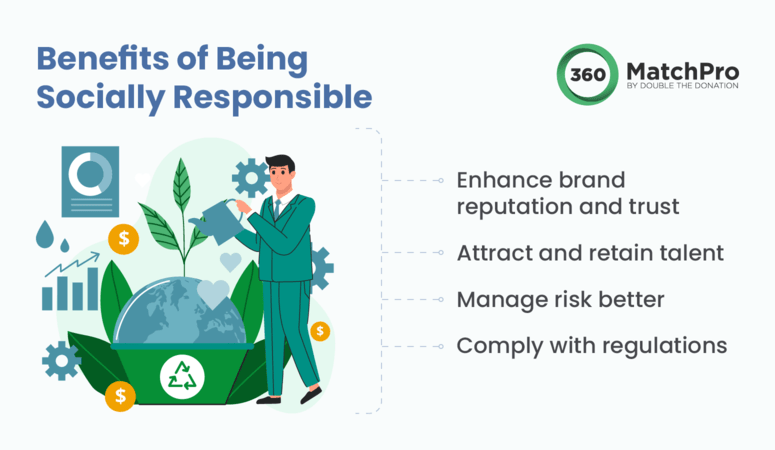
- Enhance brand reputation. Companies that engage in CSR activities demonstrate a commitment to social and environmental causes, cultivating a positive public image. Doing so leads to increased customer and investor loyalty, trust, and brand value.
- Attract and retain talent. Many employees, especially from younger generations, prefer to work for socially responsible companies. CSR initiatives can help companies attract and retain motivated employees, enhancing workforce satisfaction and productivity.
- Manage risk. CSR practices enable companies to identify and mitigate business risks related to environmental and social factors. Being proactive can safeguard a company against potential future crises.
- Comply with regulations. Meeting standards for workplace safety, credible financial reporting, and fair customer and employee treatment are legal requirements and part of a CSR strategy.
In summary, CSR enables companies to give back to the communities that support them and receive tangible benefits like customer loyalty in return.
How Do Companies Measure CSR Impact?
There’s not a “right” way to measure impact. Rather, you must employ several approaches to understand your performance holistically. Some key ways companies measure the impact of their CSR efforts include:
- Produce annual sustainability reports that detail your CSR activities and achievements.
- Review industry reporting standards like the Global Reporting Initiative (GRI), Sustainability Accounting Standards Board (SASB), United Nations Sustainable Development Goals (SDGs), and Carbon Disclosure Project (CDP). These standards provide a framework businesses can follow to evaluate their impact.
- Set specific KPIs for your programs like the amount of waste reduced, energy saved, number of community projects supported, employee volunteer hours, or funds raised for social causes. CSR technology can be incredibly helpful for tracking metrics like these.
- Use employee engagement surveys to gain insight into how CSR efforts affect employee morale.
- Ask for customer feedback and conduct market research to assess how CSR initiatives are influencing customer loyalty, brand perception, and buying behaviors.
- Get an external audit or certification from reputable organizations. Examples of certifications include those from ISO 26000 for social responsibility, B Corp Certification, or LEED Certification for environmental sustainability.
Effectively measuring your company’s CSR impact requires both quantitative and qualitative data. This allows you to understand the effectiveness of your program for matter whatever type of CSR initiative you launch.
What Are The Types Of CSR?
Corporate social responsibility is an overarching term that describes a range of activities. CSR programs can be categorized into several types, such as:
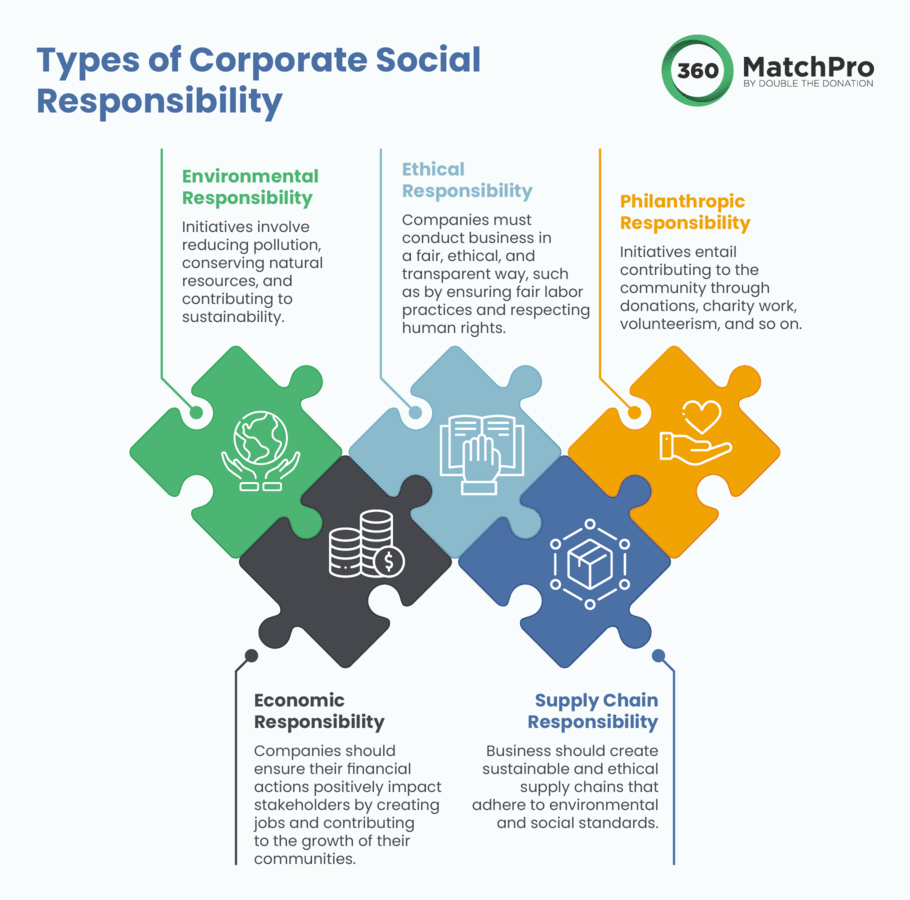
- Environmental responsibility involves initiatives to reduce pollution, conserve natural resources, and operate sustainability. Companies may engage in activities to reduce their carbon footprints, improve energy efficiency, invest in renewable energy sources, and promote sustainable resources.
- Economic responsibility requires companies to ensure positive financial outcomes for stakeholders. Companies need to create jobs, foster economic development, engage in fair business practices, and contribute to the overall growth of the communities where they operate.
- Ethical responsibility involves conducting business in a fair, ethical, and transparent way. This includes ensuring fair labor practices, avoiding corruption and fraud, and respecting human rights.
- Supply chain responsibility involves creating a sustainable and ethical supply chain. As an extension of ethical responsibility, companies should ensure their suppliers adhere to environmental and social standards, which include labor rights, environmental protection, and fair business practices.
- Philanthropic responsibility entails contributing to the community through donations, charity work, collaborative cause marketing campaigns, funding educational programs, and engaging in volunteer efforts.
Know that some CSR efforts incorporate elements from multiple categories. For instance, a company may donate or offer to match employees’ donations to environmental initiatives.
What Are CSR Examples From Real Companies?
From workplace giving to sustainable business practices, many businesses go above and beyond in their CSR efforts. Statista cites the following businesses as having the highest CSR scores as of 2023:
- Hewlett-Packard (HP) demonstrates an incredible commitment to climate action, human rights, and digital equity. For instance, HP spent $423 million on small U.S. businesses, helped nonprofit partners plant nearly 2 million trees, and equipped 7.4 million students and teachers with technology through a partnership with Girl Rising.
- General Mills categorizes its goals into three categories: food, planet, and people. A few highlights of their CSR impact include ensuring 100% of their company-owned production facilities are Global Food Safety Initiative (GFSI) certified, making 92% of General Mills packaging recyclable or reusable, and contributing $90 million to charity.
- Whirlpool has been committed to using time, expertise, and quality appliances to impact consumers, communities, and the environment positively for the past 111 years. One of its most notable initiatives is its ongoing collaboration with Habitat for Humanity. For over 23 years, they’ve donated over $136 million and more than 212,800 products to Habitat for Humanity families globally.
Statista ranked these companies based on publicly available KPIs from corporate annual reports, CSR reports, and similar public resources. They also factored in results from a public survey that gauged U.S. citizens’ perceptions of major companies.
Following in these companies’ footsteps will help you lay the foundation for your company’s initiatives, whether you’re starting small or looking for innovative ways to expand your current efforts.
CSR Statistics to Know
Without further ado, let’s jump into some CSR statistics that show why companies need to operate sustainably and support worthwhile causes. Later, we’ll look at workplace giving specifically since it’s become a major employee engagement tool, but for now, let’s look at CSR more broadly.
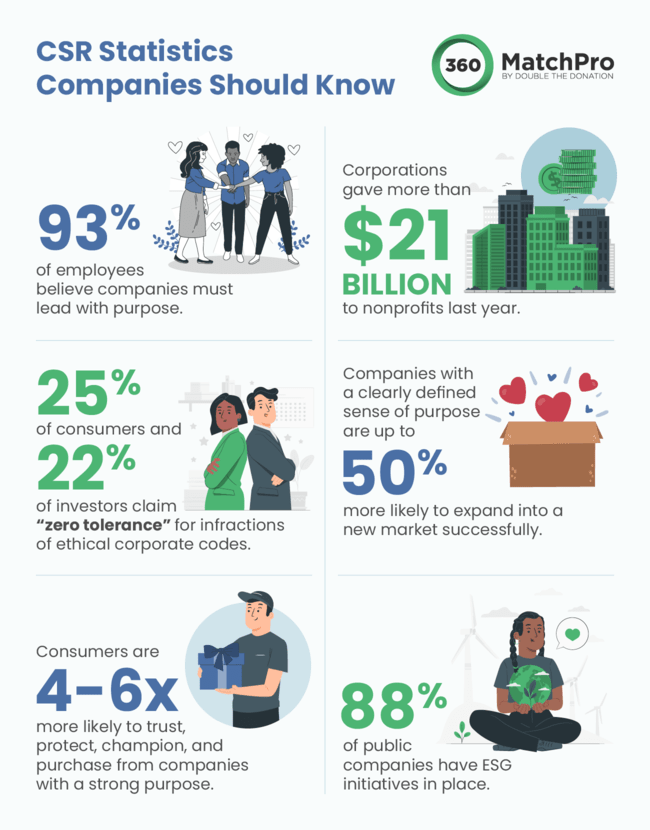
93% of employees believe that companies must lead with purpose.
This CSR statistic was pulled from Porter Novelli’s study on employee perspectives on modern topics, like social justice and racial inequality. This CSR research reflects a broader trend of employees increasingly seeking more than financial compensation from their jobs. Instead, they want to work for organizations that align with their personal values and contribute positively to society.
For companies, this means that having a clear and meaningful purpose beyond making profits is essential for attracting and retaining talent.
Corporations gave more than $21 billion to nonprofits in 2022.
Giving USA produces an annual report on philanthropy, and 2022’s study found that companies gave more than $21 billion to nonprofits. This substantial financial contribution reflects how companies recognize the value of investing in social and environmental causes, not just as a moral imperative but also as a strategic business decision. Small businesses and major corporations alike have realized the power of donating and matching employees’ donations as a way to strengthen their social responsibility efforts.
25% of consumers and 22% of investors claim “zero tolerance” for infractions of ethical corporate codes.
CSR research from Aflac uncovered that consumers are serious about the companies they purchase from. 1 in 4 customers place high expectations on businesses regarding ethical conduct and are willing to change their buying practices at the first infraction.
For companies, this means not only establishing robust ethical guidelines but also ensuring they’re consistently followed. Any deviation from ethical norms can have serious repercussions, like loss of customer trust and investor confidence.
Companies with a clearly defined sense of purpose are up to 50% more likely to expand into a new market successfully.
Harvard Business Review partnered with the EY Beacon Institute and conducted a global survey of 474 executives, in which they found that corporate professionals believe purpose matters and can drive a company’s success.
In particular, this CSR statistic underscores the strategic advantage of having a purpose-driven corporate identity and ethical compass. When expanding into new markets, a strong and well-articulated sense of purpose provides direction, helping a company align its strategies with local market needs and cultural values. A sense of purpose also differentiates a company from competitors, making it more appealing to new consumers.
Consumers are 4-6x more likely to trust, protect, champion, and purchase from companies with a strong purpose.
Consumers are more likely to go above and beyond for companies that communicate a clear purpose. A Strength and Purpose study from Zeno found that when consumers believe a brand has a strong purpose, they are:
- 4.1x more likely to trust the company
- 4x more likely to purchase from the company
- 6x more likely to protect the business if faced with public criticism
- 4.5x more likely to champion the company by recommending it
Today’s consumers have endless choices, and your company’s purpose can be a vital differentiator for sustaining customer loyalty and trust.
As you think through your company’s CSR strategies, consider how you’ll authentically integrate a sense of purpose into your operations. After all, it’s a powerful driver of consumer behavior.
88% of public companies have ESG initiatives in place.
Several companies are implementing Environmental, Social, and Governance (ESG) initiatives in response to the demands of stakeholders who increasingly value sustainability and ethical practices. After all, 89% of investors consider ESG issues as part of their investment approach.
ESG considerations are mainstream in the business world and for good reason. While these initiatives can reduce risks and enhance reputation, they can also lead to operational efficiencies, strengthen innovation, and open up new markets. For companies, creating ESG initiatives is now essential to remain competitive and maintain trust.
Workplace Giving Statistics
One of the most impactful ways companies increase their impact is through workplace giving. Also known as employee giving, workplace giving involves charitable giving initiatives completed by your company’s employees with your business’s help, such as matching gifts, payroll deductions, and corporate volunteerism. Let’s look at the impact of these programs through CSR statistics.
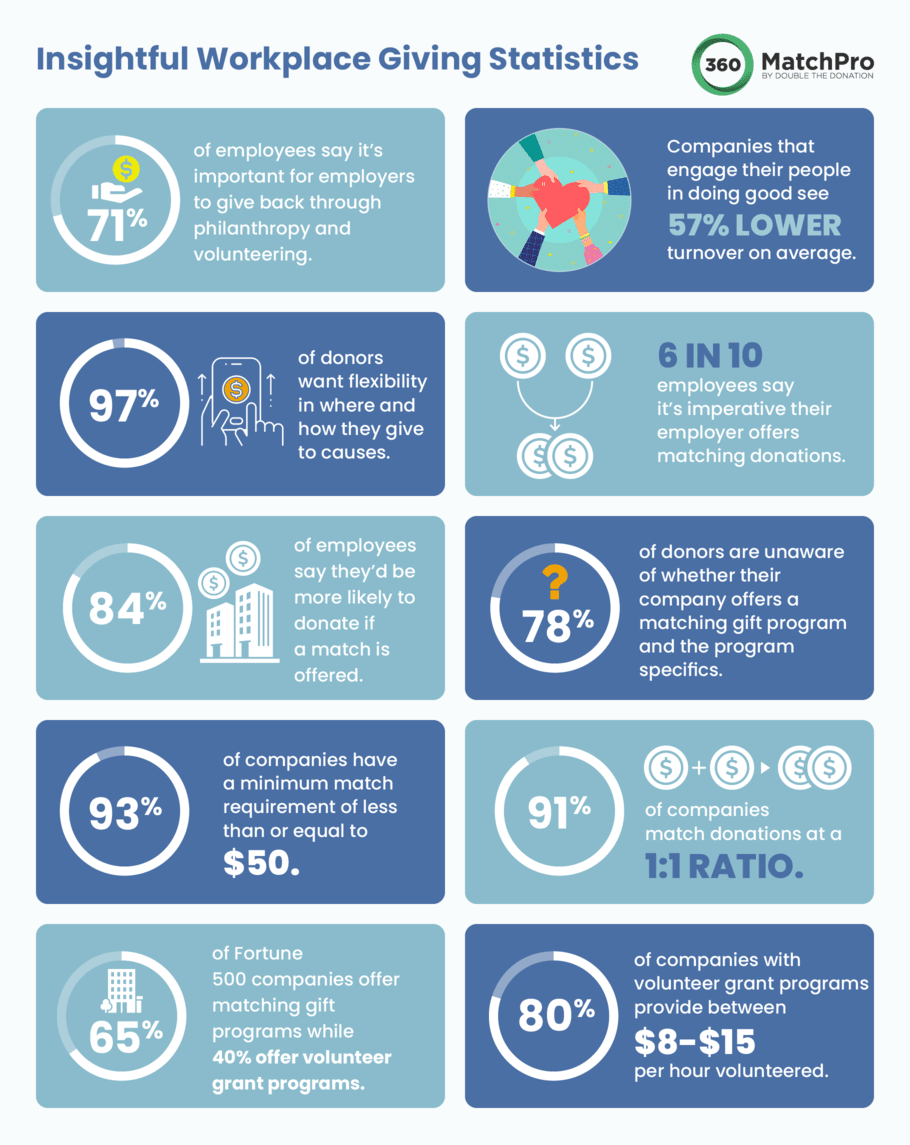
97% of donors want flexibility in where and how they give to causes they care about.
Nonprofits Source’s online giving research shows that employees want to give back in ways that matter to them. Luckily, your company has plenty of workplace giving opportunities at its disposal, such as:
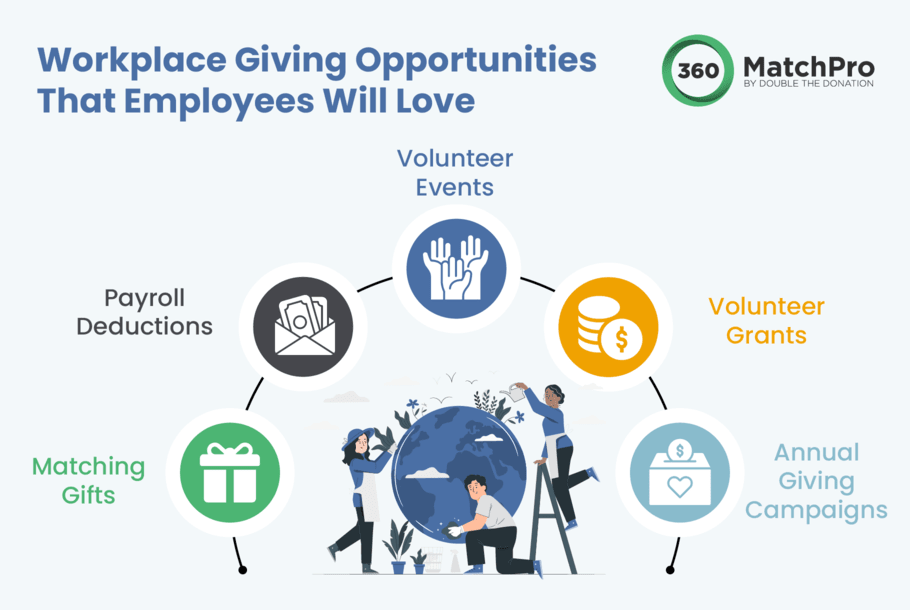
- Matching gifts: With this program, you’ll match employees’ charitable donations to eligible nonprofits. Outline and distribute participation guidelines such as the amounts you’ll match, match ratio, and which nonprofits are eligible.
- Payroll deductions: Employees can automatically donate a portion of their paycheck to a charity of their choice.
- Volunteer opportunities: Line up company volunteer days or share volunteer opportunities, so employees can find ones that are meaningful to them.
- Volunteer grants: Donate to nonprofits where employees regularly volunteer. Businesses give volunteer grants based on an hourly basis or donate a set amount once a certain threshold of hours is met.
- Annual giving campaigns: These company-wide campaigns encourage employees to donate to pre-selected charities, often with themes or specific goals.
Looking at these options, you might be overwhelmed by the sheer number of choices. To select a program, assess the type of impact you want to make. Then, consider what initiatives will support those goals and give your employees the ability to support the causes they care about.
Best of all, these aren’t the only options out there, so if these programs don’t fit your employees’ needs, keep looking for new opportunities!
71% of employees say it’s important for employers to give back through philanthropy and volunteering.
Our CSR research has found that today’s workforce highly values CSR, particularly in terms of philanthropy and community involvement. Employees are increasingly seeking work that provides, resulting in a desire to be part of organizations that contribute positively to society.
Companies can show they care about supporting employees’ philanthropic endeavors by integrating philanthropy into the workplace. This might involve lining up team volunteer activities, enabling payroll deductions, and offering matching gifts.
Companies that engage employees in doing good see an average of 57% lower turnover.
Employee giving research from Benevity uncovered this CSR statistic. It shows that employees are more satisfied when they have the opportunity to make a meaningful difference. From improving mental health to developing a stronger connection to the company, engaging in CSR activities helps employees feel that their work contributes to society.
For your company, lower turnover means spending less on recruiting and training new employees since you’ll maintain your experienced workforce. Therefore, incorporating social good into company culture is a moral and strategic decision.
6 in 10 employees say it’s imperative their employer offers matching donations.
America’s Charities Snapshot takes an in-depth look at what U.S. employees think about workplace giving and CSR. Their report underscores employees’ growing expectations for corporate involvement in social causes, particularly through matching gifts. It reflects a broader shift in attitudes toward workplace giving, communicating that matching gifts are a critical component of a company’s value system.
Employees seek businesses that not only allow them to contribute to societal causes but also actively amplify their efforts. While donation matching programs require forethought, they’re actually one of the easiest ways to strengthen your company’s commitment to social responsibility. After defining participation guidelines and request deadlines, your company’s CSR software can even facilitate the ongoing management of your matching gift program.
84% of employees said they’d be more likely to donate if a match is offered.
What’s more, one in three say they would give a larger gift if matching is applied. Employees want their charitable contributions to make a difference, and when a company promises to match those donations at a generous rate, that communicates the company wants the same thing!
Moreover, by increasing participation in workplace giving, these programs can strengthen your company’s reputation as a socially responsible employer.
78% of donors are unaware if their company offers a matching gift program and the program specifics.
What’s more, 16% of donors know their company offers matching gifts but are unsure if they’re eligible or how to submit a request. Despite the prevalence of matching gift programs, the lack of awareness among employees means that many potential matching donations are not fulfilled. This gap represents a missed opportunity for companies and nonprofits.
A lot goes into developing a matching gift program, including defining employee eligibility, match ratios, minimum and maximum donation amounts, and request deadlines. For employees, this can be confusing. They might not understand the intricacies of your program even if they know the opportunity is available. It’s up to your company to spread awareness and simplify the process. Luckily, auto-submission can help:
As the latest and greatest development in matching gift technology, auto-submission reduces the number of steps in the match request process for your employees. To leverage it at your company, invest in CSR software that integrates with matching gift technology. Then, when one of your employees gives to a nonprofit that uses 360MatchPro’s matching gift software, they can opt into auto-submission. If eligible, the tools will automatically fill out your company’s match request form and submit it to you.
93% of companies have a minimum match requirement of less than or equal to $50.
We pulled this CSR statistic from our own corporate giving research. Essentially, most companies promise to match small donations. This is great news for your employees and your company! With lower donation amount requirements, you lower the barriers to participation. More employees will be eligible to have their gifts matched, and you’ll be able to increase your company’s social impact.
The widespread adoption of small minimum match requirements demonstrates that every employee contribution matters, even modest ones. Try setting the threshold at $50 or less. In turn, you’ll foster a more inclusive culture of philanthropy.
91% of companies match donations at a 1:1 ratio.
Companies are serious about supporting employees’ charitable contributions, and the majority match their employees’ donations at a dollar-per-dollar rate. For every employee donation given, the company also contributes an equal amount, effectively doubling each gift.
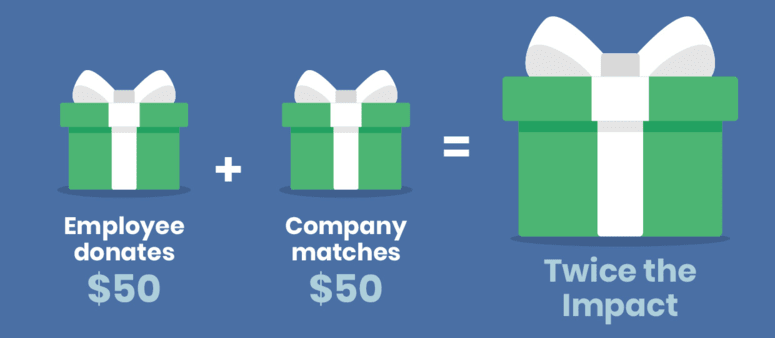
Meanwhile, 4% of companies match at a lower rate, such as 0.5:1. This means an initial donation of $100 results in a $50 corporate match, totaling $150. On the other side of the spectrum, 5% of companies match at a higher rate, such as 2:1. In that case, a $100 donation can produce a $200 corporate matching, totaling $300.
65% of Fortune 500 companies offer matching gift programs while 40% offer volunteer grant programs.
The prevalence of matching gift programs among leading companies demonstrates the importance of supporting charitable causes in ways that get employees involved. By matching employees’ charitable contributions, these companies amplify their workforce’s philanthropic efforts.
The lower, but still substantial, percentage of Fortune 500 companies offering volunteer grant programs reflects a growing understanding of the value of hands-on engagement in community service. For businesses, both types of programs are essential for building a positive culture.
80% of companies with volunteer grant programs provide between $8-$15 per hour volunteered.
If volunteerism is important to your workforce, be generous with your volunteer grants. By donating when employees spend their time volunteering, these grants turn volunteer hours into impactful financial donations.
Not only does this level of generosity incentivize employee volunteerism, but it also amplifies impact and reinforces a culture of giving.
Final Thoughts on These CSR Statistics
Once a token gesture, CSR initiatives are now imperative for a positive corporate image, employee satisfaction, and stakeholder perceptions. The numbers don’t lie, and these CSR statistics show the transformative impact of CSR on the modern business landscape.
From following ethical standards to establishing generous workplace giving opportunities, your company can make powerful strides toward achieving greater outcomes by focusing on social impact.
If you need actionable next steps for strengthening your CSR strategy, check out these educational resources:
- How to Start a Matching Gift Program [For Companies]. Corporate matching gifts are the easiest way to enhance your social responsibility. Discover how to launch a foolproof program that inspires employee participation.
- Corporate Giving Software: How to Choose the Best Solution. The right corporate giving tools can enhance your CSR initiatives. Explore some of the greatest tools for powering your philanthropic efforts.
- What Is Corporate Volunteerism? The Top Guide for Companies. If volunteerism is the right move for your employees, explore this guide about launching a strong program.

